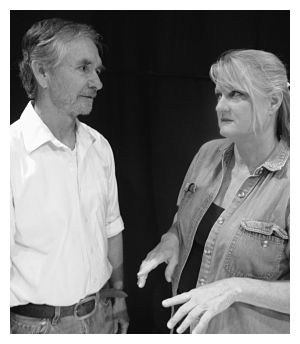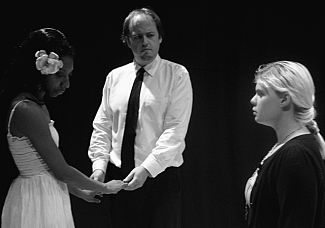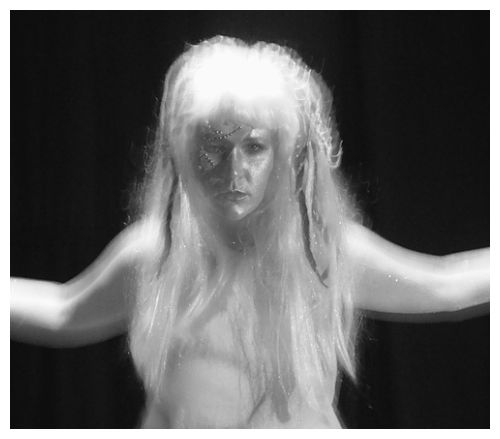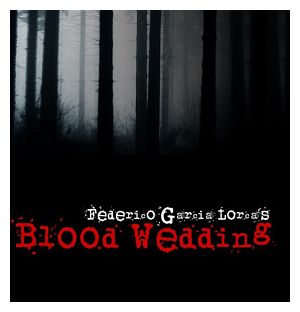Review: Bodas de Sangre (Blood Wedding) by Wondrous Strange Players
by Brian Paul Scipione
Darkness at the Break of Noon: Federico García Lorca’s Blood Wedding
The stage is stark, the lights are dim, the crickets and the wind are rumbling in the background. A woman, weary and worried, enters the room and falls into a stiff chair. Her son comes through with the intention of going to work. The word knife enters the conversation and the mother explodes, going from worry to wailing at the world’s iniquities. She is bitter and inconsolable; she has lost her husband and oldest son to murders. She blames knives, evil people and the society that engenders them but her son is persistent, hopeful, and loving. He wants to get married and needs her blessing and counsel. She recognizes the hope in his eyes and begins discussing the proper wedding customs, yet the tone in her voice has not changed. What good are marriage, love and truces in the land of the dead? Every child born is to live its life mere seconds away from the cold dirty steel of a hateful man’s blade. The tone of the play is set: if life is bad it can only get worse.

Federico García Lorca was born in the Granada province of Spain in 1898. His first play The Butterfly’s Evil Spell was produced in Madrid when he was 22. It is the story of an injured butterfly and the cockroach that falls in love with her. García Lorca travelled throughout Cuba and North America, but his subjects and literary endeavors always strove to capture the social dynamics of his native home in rural Spain. Edwin Honing writes, “Lorca, in his folk plays, seems to be saying that the matriarchal society that for centuries has sustained such ideals has by now completely devitalized them. What remains is an anachronistic virtue that propels its representatives to inevitable defeat” (1947).
His are works of pathos that reach proportions of such desperation that they encroach upon the Theater of the Absurd. Yet, García Lorca’s reality in Spain was not far from this. By his thirties he had become the director of the government-sponsored theater La Barraca. His play Blood Wedding had opened to acclaim in Madrid and was reprised later that same year in Buenos Aires. The chaos of the Spanish Civil War descended upon the countryside in July of 1936. It is widely believed that García Lorca was assassinated by the right-wing Falangists (though some controversy remains). His own end was seemingly predicted by his work. “A tragedy that validates personal integrity evidently fails in the modern world,” writes Honig, “where it cannot be resolved in terms of social acknowledgment, since society invariably degrades by nullifying the virtue of personal integrity” (1947). These ideas have never been more actualized than in the Spanish Civil War in which the Fascists and the Communists (each disparaging the role of the individual in society) battled it out.
 The Wondrous Strange Players under the direction of Michael Floyd have taken on the challenge of bringing these ideas back to light in their latest production at the Community Renaissance Market, García Lorca’s Blood Wedding. Floyd has re-set the play in present-day Appalachia, USA. Yet no moonshine stills or banjo plunking feature in this scene. This presentation encompasses little more than subtle lighting, a near-barren stage, and the bravado of the performers. The story line continues as the would-be groom and his mother go to ask for the hand of his beloved in traditional fashion. The father of the bride uses sparse phrasing that demonstrates his similarly fatalistic attitude -- as if he can see nothing beyond the obvious as to why these two shouldn’t be wed. The obvious being Leonardo: the former beloved of the bride, a passionate man hewn from the same wild in which he lives. He rides horses as if the devil is at his heels, rants at his wife and his mother-in-law and stalks the stage like a recoiled fist waiting to strike.
The Wondrous Strange Players under the direction of Michael Floyd have taken on the challenge of bringing these ideas back to light in their latest production at the Community Renaissance Market, García Lorca’s Blood Wedding. Floyd has re-set the play in present-day Appalachia, USA. Yet no moonshine stills or banjo plunking feature in this scene. This presentation encompasses little more than subtle lighting, a near-barren stage, and the bravado of the performers. The story line continues as the would-be groom and his mother go to ask for the hand of his beloved in traditional fashion. The father of the bride uses sparse phrasing that demonstrates his similarly fatalistic attitude -- as if he can see nothing beyond the obvious as to why these two shouldn’t be wed. The obvious being Leonardo: the former beloved of the bride, a passionate man hewn from the same wild in which he lives. He rides horses as if the devil is at his heels, rants at his wife and his mother-in-law and stalks the stage like a recoiled fist waiting to strike.
The tension builds and builds, the wedding nears, and the characters’ anxiety is poignant and thick, filling the theater with the awkward air of an elevator full of strangers or the uncomfortable moment when a parent spanks a crying child in public. We see the bridesmaid tease and cajole the bride, but any smile she elicits is short-lived. There are many poetic interludes throughout the play, pregnant with symbolism and expressing the playwright’s personal philosophy. An emotive yet maudlin wedding song is beautifully performed by the bridesmaid. This respite of melody is fleeting, as we now see the after-wedding scene. The bride is beyond morose, complaining of a headache and retreating from every possible advance made by her new husband. The groom’s mother advises violence, assuring him that his own father was the master of a well placed wrist squeeze and stern tone. Leonardo’s wife crosses the stage, desperation pouring in torrents from her mouth, “Where is he? Where is he?” The inevitable seems suddenly so blithely evitable . . . .

The Wondrous Strange Players bring this philosophical period piece to life with both skill and a heartfelt ferocity of emotions. It is a daring piece that embraces the idea of theater as story-telling in its rawest form. While other groups strive to find pieces that are widely acclaimed or easily understood, the Players have followed Samuel Beckett’s classic advice “To be an artist is to fail, as no other dare fail” and in doing so they have succeeded.
Bodas de Sangre (Blood Wedding)
by Federico García Lorca
Wondrous Strange Players
6800 Westgate
Austin, TX, 78745
